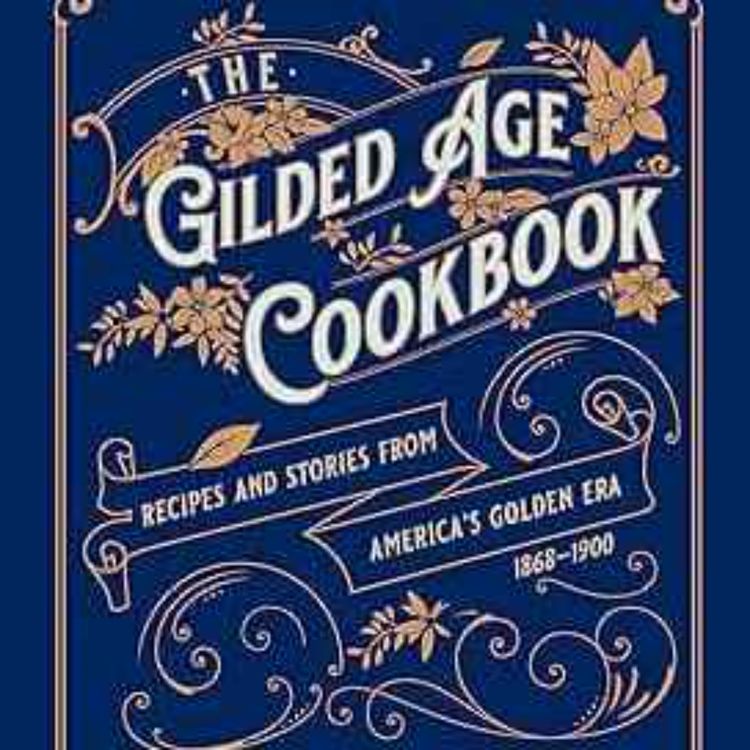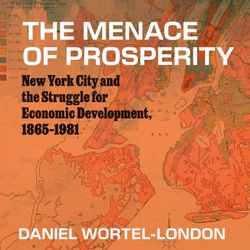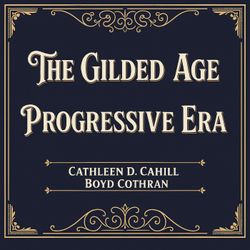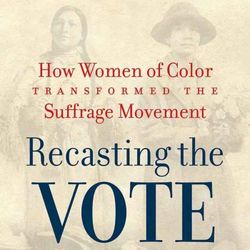Share

The Gilded Age and Progressive Era
Special Episode: The Gilded Age Cookbook
Are you stuck for that showstopper holiday roast or side dish? Becky Diamond's latest book, The Gilded Age Cookbook is there to help. Go back in time to see how families ate during the holidays. And please try the "devilled spaghetti." The recipe is listed here!
Essential Reading:
Becky Diamond, The Gilded Age Cookbook: Recipes and Stories from America's Golden Era (2023).
Recommended Recipe (Full Recipe in Book):
Butter six ramekins or Texas-size muffin pans and set aside.
Cook the spaghetti until al dente, about 10 minutes. Drain and allow to cool. When cool, chop finely and set aside.
Melt the butter in a large saucepan over medium heat. Add the flour and whisk together to form a paste. Add the milk and bring to a boil, stirring constantly. Turn down to low and add the chopped eggs, salt, cayenne, onion powder, nutmeg, and parsley.
Add the spaghetti to the sauce, stirring until combined. Using a large ladle, divide spaghetti mixture among the ramekins or muffin pan cups.
Mix bread crumbs and melted butter in a small bowl. Spoon on top of spaghetti.
Transfer to the oven and bake for 30 minutes until tops are nicely browned. Remove from the oven and set on a wire rack to cool for at least 10 minutes. When cool, remove from the muffin pan by running a knife around the edges and carefully turning out onto a plate. If using ramekins, serve in the individual ramekin dishes. Make an indentation in the top of each with the back of a spoon and add a teaspoon of chili sauce if desired. Serve immediately.
More episodes
View all episodes

112. 112: The Menance of Prosperity
01:00:00||Ep. 112In this episode of The Gilded Age and Progressive Era Podcast, Boyd Cothran speaks with historian Daniel Wortel-London about his new book, The Menace of Prosperity, a sweeping history of New York City and the political economy of urban growth from the aftermath of the Civil War through the late twentieth century.The conversation centres on the Gilded Age and Progressive Era, when New York’s leaders increasingly tied the city’s finances to real estate development, municipal debt, and rising property values. Wortel-London introduces two key concepts—social costs and fiscal imaginaries—to explain how elite-driven prosperity repeatedly generated fiscal crises, inequality, and instability, even as critics advanced alternative visions rooted in cooperation, public ownership, and democratic control of urban resources.Along the way, Boyd and Daniel discuss the 1870s fiscal crisis and fears of “monstrous growth,” Gilded Age fiscal radicals and the cooperative commonwealth, Henry George and the single tax, Progressive Era debates over municipal ownership and planning, and interwar struggles over housing and economic stabilization. The episode concludes by tracing how these late nineteenth- and early twentieth-century choices shaped the New Deal, the 1970s fiscal crisis, and contemporary debates over housing, development, and inequality in New York.The Menace of Prosperity is available from the University of Chicago PressContact the host:Boyd Cothran can be reached at cothran@yorku.ca
111: The Best of: Chasing Beauty: The Life of Isabella Stewart Gardner
51:16|There are a few people that embody a period. Isabella Stewart Gardner knew many of the the movers and shakers of the Gilded Age and lived from 1840-1924. Her story, and her compulsion to buy the art of the age, makes her a great lens through which to understand the Gilded Age. Dr. Natalie Dykstra joins the show to discuss her latest biography of Bella.Natalie Dykstra, Chasing Beauty: The Life of Isabella Stewart Gardner (2024).The webpage for Clara Endicott Sear's Fruitland Museum can be found at https://thetrustees.org/place/fruitlands-museum/
110. 110: The Gilded Age Christmas Cookbook
42:19||Ep. 110In this festive episode of the Gilded Age & Progressive Era podcast, we welcome back food historian Becky L. Diamond to discuss her latest book, The Gilded Age Christmas Cookbook. Using recipes as historical evidence, Becky takes us into nineteenth-century kitchens to explore how Christmas took shape during the Gilded Age—an era defined by inequality, immigration, and the rise of modern consumer culture.We talk about forgotten holiday treats like sugar plums, German and Central European influences on the American Christmas table, the labor behind seasonal abundance, and the challenges of translating nineteenth-century recipes for modern kitchens. Along the way, Becky shows how food opens a powerful window onto aspiration, memory, and domestic life in the Gilded Age.This episode builds on Becky’s earlier appearance on the podcast for The Gilded Age Cookbook and reminds us why food history belongs at the centre of Gilded Age and Progressive Era scholarship.----Becky L. Diamond, The Gilded Age Christmas Cookbook (Lyons Press)Becky L. Diamond, The Gilded Age Cookbook
109. 109: Best of: The Allure of Empire
01:09:47||Ep. 109While Cathleen and I are working on new content for the podcast—lots of great episodes are on the way—we’re also taking time to revisit some of Michael’s excellent past interviews.For my second “best of” pick, I chose Episode 54, The Allure of Empire, which first aired on July 4, 2023. In this episode, Michael talks with historian Chris Suh about his award-winning book The Allure of Empire: American Encounters with Asians in the Age of Transpacific Expansion and Exclusion. Suh’s work invites us to rethink the Gilded Age and Progressive Era through the lens of empire—tracing how U.S. expansion in the Pacific intertwined with racial exclusion and the politics of belonging at home.It’s a rich, thought-provoking conversation that shows how the legacies of the Gilded Age still shape America’s place in the world today.We hope you’ll enjoy (re)listening as much as we did—and, as always, we’d love to hear which past episodes have been your favourites!Essential Reading:Chris Suh, The Allure of Empire: American Encounters with Asians in the Age of Transpacific Expansion and Exclusion (2023).Recommended Reading:David C. Atkinson, The Burden of White Supremacy: Containing Asian Migration in the British Empire and the United States (2016).Eiichiro Azuma, Between Two Empires: Race, History, and Transnationalism in Japanese America (2005).Thomas Bender, A Nation among Nations: America’s Place in World History (2006).Akira Iriye, Pacific Estrangement: Japanese and American Expansion, 1897– 1911 (1972).Richard S. Kim, The Quest for Sovereignty: Korean Immigration Nationalism and U.S. Sovereignty, 1905– 1945 (2011).
108. 108: Best of: Oceans of Grain: Wheat, Russia, Ukraine, and the U.S.
55:21||Ep. 108While Cathleen and I are working on new content for the podcast—stay tuned, there’s lots of exciting stuff coming—we wanted to take a moment to revisit some of Michael’s excellent past episodes.For my first “best of” pick, I chose Episode 17, Oceans of Grain, which originally aired on March 2, 2022. In this episode, Michael talks with historian Scott Reynolds Nelson about how the global trade in wheat reshaped the modern world. It’s a fascinating look at how the Gilded Age and Progressive Era fit into a much larger story of empire, capitalism, and global connection.When the episode first aired, Russia had just invaded Ukraine, and Nelson’s discussion of the Black Sea grain routes suddenly felt eerily relevant. Listening again now, it’s striking how powerfully this conversation links nineteenth-century global trade to the world we live in today.We hope you’ll enjoy (re)listening as much as we did—and we’d love to know which episodes stand out as your favourites!Essential Reading:Scott Reynolds Nelson, Oceans of Grain: How American Wheat Remade the World (2022).Recommended Reading:Neal Ascherson, The Black Sea (1996).Bettany Hughes, Istanbul: A Tale of Three Cities (2017).Avner Offer, The First World War: An Agrarian Interpretation (1989).Vaclav Smil, Creating the Twentieth Century: Technical Innovations of 1867-1914 and their Lasting Impact (2004).
107: Best of: “Gilded? Progressive? Let’s Call the Whole thing Off?"
55:27|Boyd and I are working on new content for the podcast-we have lots of good stuff planned for the future.But in the meantime, we wanted to take a moment to revisit some of Michael’s excellent content.We each picked two of the previous episodes as our “best of” but we totally acknowledge that we could have picked many more than two; this was a very tough choice, but we hope you enjoy (re)listening as much as we did. And we'd love to know which are your favorite episodes!Christopher McKnight Nichols and Nancy Unger, A Companion to the Gilded Age and Progressive Era. (John Wiley & Sons, 2017)https://onlinelibrary.wiley.com/doi/book/10.1002/9781118913994For a nice short introduction to historical thinking with some more definitions, check out Flannery Burke and Thomas Andrews' Perspectives essay, "What Does it Mean to Think Historically": https://www.historians.org/perspectives-article/what-does-it-mean-to-think-historically-january-2007/
106. 106: Recasting the Vote
54:17||Ep. 106Think you know the story of women’s suffrage? Think again. In this episode of The Gilded Age and Progressive Era Podcast, Boyd sits down with co-host Cathleen D. Cahill to discuss her groundbreaking book Recasting the Vote: How Women of Color Transformed the Suffrage Movement (UNC Press, 2020). Cahill’s book challenges the traditional narrative of women’s suffrage by centring the Indigenous, African American, Latina, and Asian American women who organized, mobilized, and redefined the fight for political rights.Cahill introduces us to a cast of remarkable women—Zitkála-Šá, Mabel Ping-Hua Lee, Carrie Williams Clifford, and Adelina “Nina” Otero-Warren—who pushed the fight for the vote beyond white, middle-class reformers. Their activism linked suffrage to sovereignty, citizenship, immigration, and racial justice, recasting the movement as part of a much bigger struggle for equality.Along the way, we explore why the story doesn’t end in 1920 with the Nineteenth Amendment—and why it still matters for today’s fights over voting rights.Further Reading:Leila J. Rupp, Worlds of Women: The Making of an International Women’s Movement (1997)Martha S. Jones, Vanguard: How Black Women Broke Barriers, Won the Vote, and Insisted on Equality for All (2020)Michelle Duster, Ida B. the Queen: The Extraordinary Life and Legacy of Ida B. Wells (2021)Alison M. Parker, Unceasing Militant: The Life of Mary Church Terrell (2020)Jad Adams, Women and the Vote: A World History (2014)
105: The Sentimental State
01:09:25|Today Cathleen interviews Elizabeth Garner Masarik, about her book, The Sentimental State: How Women-Led Reform Created the American Welfare State (University of Georgia Press, 2024), which is the 2025 winner of SHGAPE's H. Wayne Morgan Book Prize. For more information about the Society's three book awards (deadlines in October) see https://www.shgape.org/prizes-awards/Books mentioned by Dr. Masarik in today's interview:Katherine G. Aiken, Harnessing the Power of Motherhood: The National Florence Crittenton Mission, 1883-1925 (University of Tennessee Press, 1998)Brian Balogh, The Associational State: American Governance in the Twentieth Century (University of Pennsylvania Press, 2015)Regina Kunzel, Fallen Women, Problem Girls: Unmarried Mothers and the Professionalization of Social Work, 1890-1945 (Yale UP, 1993)Rickie Solinger, Wake up Little Susie: Single Pregnancy and Race Before Roe v. Wade (Routledge, 1992)Molly Ladd Taylor, Raising a Baby the Government Way: Mothers’ Letters to the Children’s Bureau, 1915-1932 (Rutgers University Press, 1986)Jane Tomkins, Sensational Designs: The Cultural Work of American Fiction, 1790-1860 (Oxford UP, 1985)
104: The Voyage of the Edwin Fox
01:00:00|Hello listeners! Boyd and Cathleen are back and looking forward to giving you more regular content this fall. This week, Cathleen interviews Boyd about his recent book, The Voyage of the Edwin Fox: How An Ordinary Sailing Ship Connected the World in the Age of Globalization (UNC 2023). In this sweeping story of globalization seen from the deck of an ordinary ship, the small details, individual people, and multiple connections that made up this tumultuous moment in history become clear.